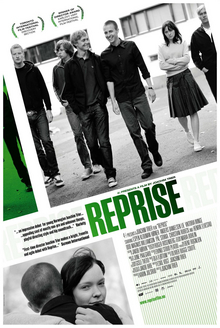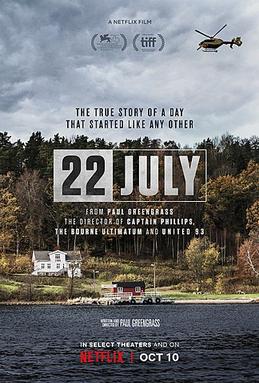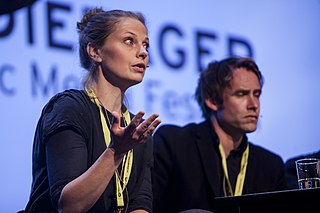
The culture of Norway is closely linked to the country's history and geography. The unique Norwegian farm culture, sustained to this day, has resulted not only from scarce resources and a harsh climate but also from ancient property laws. In the 19th century, it brought about a strong romantic nationalistic movement, which is still visible in the Norwegian language and media. In the 19th century, Norwegian culture blossomed as efforts continued to achieve an independent identity in the areas of literature, art and music. This continues today in the performing arts and as a result of government support for exhibitions, cultural projects and artwork.

Cinema in Norway has a long history, dating back to the beginning of the 20th century, and has an important stance in European cinema, contributing at least 30 feature-length films a year.

Historias mínimas is a 2002 Argentine drama film directed by Carlos Sorín and written by Pablo Solarz. The film was produced by Martin Bardi, Leticia Cristi, and José María Morales. It features, among others, Javier Lombardo, Antonio Benedicti and Javiera Bravo.

Reprise is a 2006 Norwegian comedy-drama film directed by Joachim Trier and co-written, over the course of five years, by Trier and Eskil Vogt. It is Trier's first feature-length film and the first, along with Oslo, August 31st (2011) and The Worst Person in the World (2021), in the director's Oslo trilogy.

Hawaii, Oslo is a 2004 Norwegian drama film, directed by Erik Poppe with a screenplay by Harald Rosenløw Eeg. It stars Trond Espen Seim, Aksel Hennie, Jan Gunnar Røise and Petronella Barker.

Buddy is a 2003 Norwegian film directed by Morten Tyldum after a script by Lars Gudmestad. The music was composed by Lars Lillo-Stenberg, known from the band DeLillos. The film was well received by critics, and won two Amanda Awards in 2004.

Hisham Zaman is a Norwegian film director and screenwriter of Kurdish origin. He graduated from the Norwegian Film School at Lillehammer in 2004. His films center on the stories and inner dilemmas of characters united by a common refugee experience, exploring human themes such as love, acceptance, sacrifice, revenge, loyalty and honour. He has co-written several of his scripts with the Norwegian crime novelist Kjell Ola Dahl.
Joachim Trier is a Danish-born Norwegian filmmaker. His films have been described as "melancholy meditations concerned with existential questions of love, ambition, memory, and identity." He has received numerous nominations including for a Academy Award, a BAFTA Award, two Cesar Awards, and three Cannes Film Festival Awards.
Erik Gustavson is a Norwegian film director and producer. He started out as a camera assistant and eventually moved on to cameraman before starting to work as a director in 1981.

Harald Rosenløw Eeg is a Norwegian novelist and script writer. He made his literary début in 1995 with the youth novel Glasskår, for which he was awarded the Tarjei Vesaas' debutantpris. Eeg also wrote the script for a film with the same name from 2002. He wrote the script for Hawaii, Oslo, directed by Erik Poppe and released in 2004, and for the film Uro from 2006, directed by Stefan Faldbakken. The 2008 film Troubled Water, directed by Poppe, was based on a script by Eeg. The film won the audience prize for best narrative feature film at the 16th Hamptons International Film Festival in 2008.
Anders Danielsen Lie is a Norwegian actor, musician and physician.

Pål Sverre Valheim Hagen is a Norwegian stage and screen actor. He is perhaps best known internationally for playing Thor Heyerdahl in the Oscar and Golden Globe nominated film Kon-Tiki. From 2019 to 2023, Hagen portrayed William in Exit, a series in 3 seasons that described the decadent lives of 4 men in Oslo's finance elites. It became the most streamed in the history of Norwegian national television.

Per Fugelli was a Norwegian physician and professor of General Practice at the University of Bergen from 1984 to 1992, and social medicine at the University of Oslo from 1992 until his death in 2017.

The King's Choice is a 2016 biographical war film directed by Erik Poppe. It is a co-production of Norway, Sweden, Denmark, and Ireland, and was selected as the Norwegian entry for the Best Foreign Language Film at the 89th Academy Awards. The film made the shortlist of nine films to be considered for a nomination at the 89th Academy Awards.

Utøya: July 22, also known as U – July 22, is a 2018 Norwegian drama film directed by Erik Poppe and written by Anna Bache-Wiig and Siv Rajendram Eliassen. It is based on the Utøya summer camp massacre that took place on 22 July 2011, but the characters are fictional.

22 July is a 2018 American crime drama film about the 2011 Norway attacks and their aftermath, based on the book One of Us: The Story of a Massacre in Norway — and Its Aftermath by Åsne Seierstad. The film was written, directed and produced by Paul Greengrass and features a Norwegian cast and crew. It stars Anders Danielsen Lie, Jon Øigarden, Thorbjørn Harr, Jonas Strand Gravli, Ola G. Furuseth, Ulrikke Hansen Døvigen, Isak Bakli Aglen, Maria Bock, and Seda Witt. The film had its world premiere on September 5, 2018, in the main competition section of the 75th Venice International Film Festival. and was released online and in select theaters on October 10, 2018, by Netflix.
Andrea Berntzen is a Norwegian actress and student.
Finn Gjerdrum is a Norwegian film producer.
Jan Trygve Røyneland is a Norwegian television and film writer. His notable works include The Kings Choice, a film that depicted how Norway entered World War II. For this film, Røyneland was awarded the Amanda Prize for Best Original Screenplay.

Anna Bache-Wiig is a Norwegian actress and writer. She is best known for writing the screenplay for the film Utøya: July 22 in collaboration with Siv Rajendram Eliassen.













